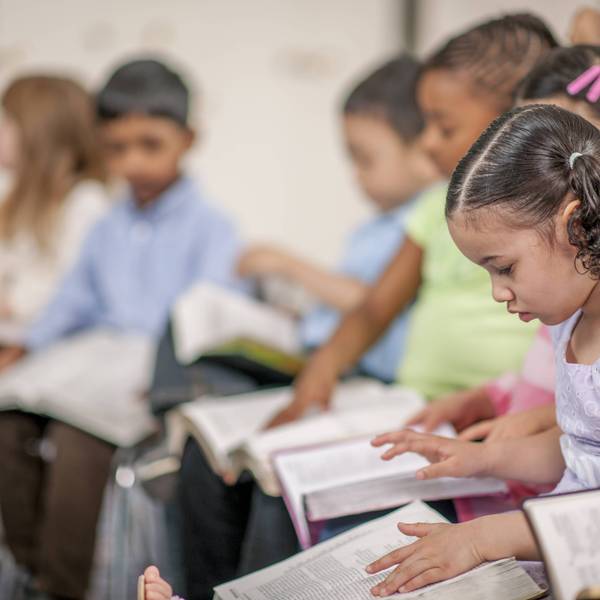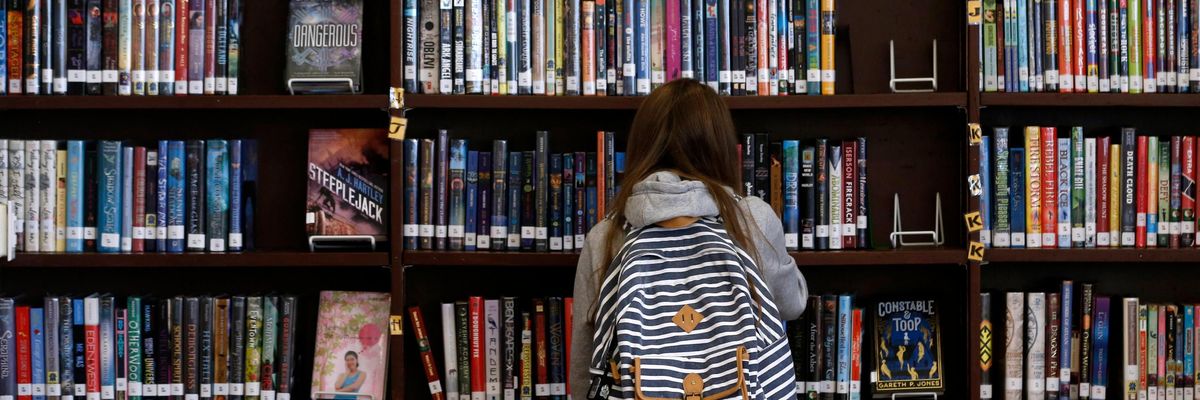New laws imposed by right-wing state legislatures have been a driving force behind a rise in book bans since the beginning of the 2022-23 school year, a national free expression group reported Thursday.
PEN America's new report, Banned in the USA: State Laws Supercharge Book Suppression in Schools, reveals that 874 unique titles were pulled from public school library shelves from July-December 2022, the result of 1,477 individual book bans.
That represents a 28% rise from the first half of 2022, and the group said the escalation is largely due to state-level "stringent policies that schools must abide by when reviewing existing library collections."
The states that have banned the most books include Texas and Florida—where Republican Gov. Ron DeSantis has pushed legislation to restrict teachers from discussing LGBTQ+ issues in classrooms and where some schools were directed to empty or cover bookshelves in order to comply with the new laws.
Just seven districts in Texas were behind 438 individual book bans and 13 school districts in Florida were responsible for 357 bans.
In previous years schools have removed books as the result of complaints by individual parents or community members, but 74% of book bans this school year have been linked to organized efforts by pro-censorship groups like Moms for Liberty, pressure from elected officials, or newly enacted state laws.
Nearly a third of the school book bans since the beginning of the school year, said PEN America, have been the direct result of laws passed in three states: Utah, Florida, and Missouri.
"The heavy-handed tactics of state legislators are mandating book bans, plain and simple," said Suzanne Nossel, CEO of PEN America. "Some politicians like Florida Gov. Ron DeSantis have tried to dismiss the rise in book bans as a 'hoax.' But their constituents and supporters are not fooled. The numbers don't lie, and reveal a relentless crusade to constrict children's freedom to read."
Public school districts across Missouri acted swiftly last year to pull 313 book titles from school library and classroom shelves after Senate Bill 775 was passed in August. The law was originally written to create new protections for survivors of sexual assault, but an amendment made it a Class A misdemeanor for librarians or teachers to provide students with so-called "explicit sexual material."
"The unfortunate reality of Senate Bill 775 is that, now in effect, it includes criminal penalties for individual educators," said one school administrator after the law was passed. "We are not willing to risk those potential consequences and will err on the side of caution on behalf of the individuals who serve our students."
Tennessee Republicans have passed a law requiring school libraries to catalogue books based on age-appropriateness, resulting in "wholesale bans" of books, the Thursday report says, as teachers and administrators "decided to remove classroom library collections rather than put themselves at risk of punishment."
Such wholesale bans are an "emerging feature" of the quickly escalating trend, said PEN America.
"We had one librarian who began pulling absolutely everything because the fear became so overwhelming," one library official in Missouri told Coda. "Others wound up shutting down their library for periods of time just so they could ensure they had gone through everything."
The group's report follows another analysis by the American Library Association, which revealed in March that across public libraries in the U.S., an unprecedented 2,571 unique titles were challenged in 2022, a 38% increase from the previous year.
Also driven by pro-censorship groups and politicians, libraries recorded 1,269 demands to censor books last year, compared to 729 demands in 2021.
In the second half of 2022, 30% of the titles banned in school libraries were about race, racism, or characters of color, while 26% of the books had LGBTQ+ themes or characters.
Gender Queer: A Memoir by Maia Kobabe and Flamer by Mike Curato—both including LGBTQ+ themes—are the most banned titles so far this year, having been prohibited in 15 school districts. Tricks by Ellen Hopkins and The Handmaid's Tale: the Graphic Novel by Margaret Atwood and Renee Nault were banned in 13 and 12 districts, respectively.
"This book ban movement erupted precisely as many schools had begun to diversify the literature they make available to young people,"
said Kasey Meehan, the Freedom to Read program director at PEN America. "Now, those books are being ripped away from students who need access to diverse ideas, information, characters, and stories. They should not be deprived of the opportunity to see themselves reflected in literature and to learn from different perspectives."




